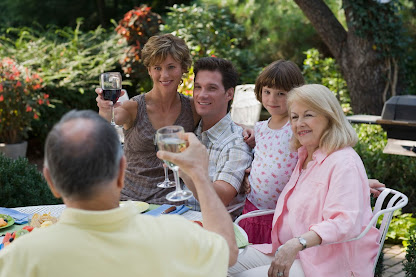5 tips to help ensure your child has healthy attitudes around alcohol
Sadly, many people see these figures and believe that it means that this is a group who have simply moved onto using illicit drugs. I don't believe that this is the case. These are teens who have never drunk alcohol - it would be truly bizarre to see a young person who has never consumed alcohol start their drug-using career by taking ecstasy/MDMA. Yes, we are seeing increasing rates of ecstasy use amongst school-based young people, but those teens who are taking ecstasy at 16 or 17 are most likely those who were drinking alcohol regularly at 14 or 15. Those who have never consumed alcohol are a completely different group.
I think there are a range of reasons for this cultural shift. These could include them wanting as healthy a brain as possible, have sporting goals they want to achieve or be as simple as their parents don't really drink and, as a result, they have made similar choices. Most importantly, however, I believe that non-drinking now has 'social value' amongst young people. The person who chooses not to drink is now regarded as an important and valued member of a social group because they are the one that looks after the others. It's a trickle-down effect from the designated driver and is so powerful and something I see everyday at schools across the country. Whatever the reason for their choice, this group of non-drinkers need their parents' support and should not be thought of as 'social rejects' who are never going to have any friends and will never be invited anywhere …
There are basically three options that a young person (or anyone for that matter) has when it comes to alcohol. They can choose to drink to excess, drink as responsibly as they are able (acknowledging that there may be a slip-up here and there!) or they can choose not to drink at all. All are valid choices (with varying degrees of risk) but all too often parents will make huge statements like "everyone drinks" or "they will all drink at some time or another", or an even bigger cop-out - "they're just doing what we did!" that are just plain ridiculous! It needs to be said that these outrageous statements are usually made to justify lazy parenting, i.e., they don't have the time or energy to fight with their teen about rules and boundaries around alcohol, so these type of throwaway lines justify that there wasn't any point to trying to stop them drinking anyway.
It is vital that parents discuss all three types of drinking - ensuring that 'not drinking' is highlighted as a perfectly valid option. As I always say, if you have a strange relative like me who doesn't drink, wheel them out occasionally and talk about them and their decisions around drinking with your teens. They need to know that adults can have a good time without alcohol and that if they choose not to drink they will not be a social outcast. It's the least a parent can do for their child that has made this tough decision.
Of course, there will be many teens who do choose to drink and, at the very least, most parents want their child to make good decisions around alcohol. There are no guarantees in this area and you can't 'inoculate' your teen around drinking, but here are five simple things you can do to help ensure they are likely to have healthy attitudes and values:
- be a positive role model – remember, your child learns so much about drinking from watching you. If you do drink, look at the role alcohol plays in your life and discuss this with them in an open and honest way, i.e., let them know that you don't drink and drive, you always have a designated driver and that when you take alcohol out with you that you're not 'drinking to get drunk'
- make your views about teen alcohol use clear – if you don't support teen drinking say so and give your reasons. Research has found that parents who clearly state their views in this area have children who are less likely to drink and if they do, they drink less. Never underestimate your influence as a parent - your words and actions do count
- try to delay their first drink of alcohol for as long as possible - this is not only important around brain development but also future risky drinking. The evidence is clear that the earlier they start drinking, the greater risk of problems when they get older
- promote positive norms - we always talk about those that 'do' drink, try to 'flip the figures' and highlight the majority that 'don't'. Try to reinforce the message that not everyone drinks alcohol and of those who do, most drink responsibly. Every time you see a media story discussing adolescents or young adults who are drinking in a dangerous or risky way, highlight the fact that there are many others who are not involved in that activity
- demonstrate you don't always need alcohol to have a good time - there's nothing wrong with having a brown paper bag with a couple of bottles in it under your arm when you go out with friends - you're an adult and can do what you want. It is important for them to see, however, that you can socialise and celebrate without drinking. It doesn't take much to make a real difference here - just occasionally decline a drink when you're at a social gathering with your teen or simply have a night out without taking alcohol with you




Comments
Post a Comment